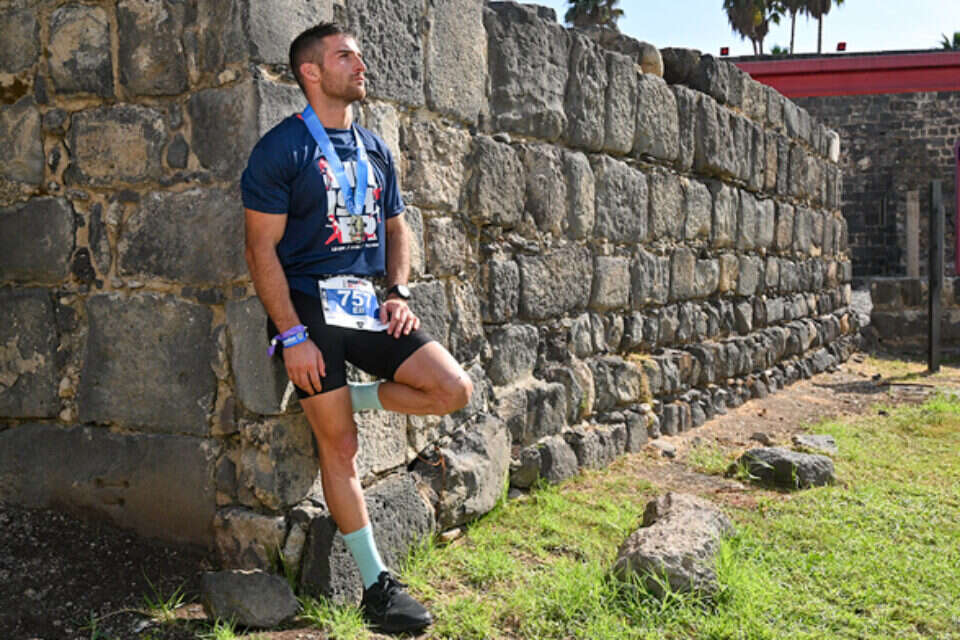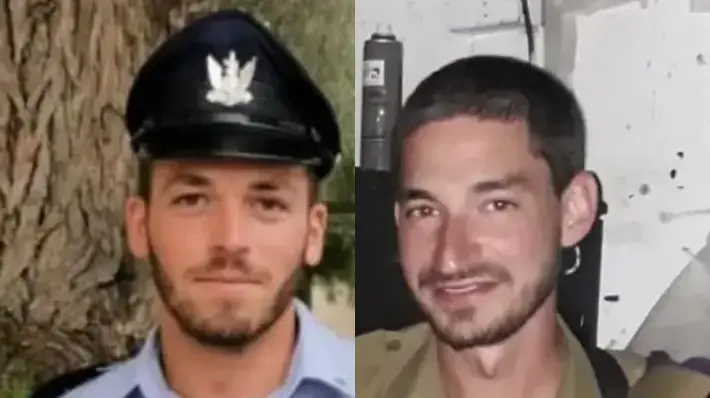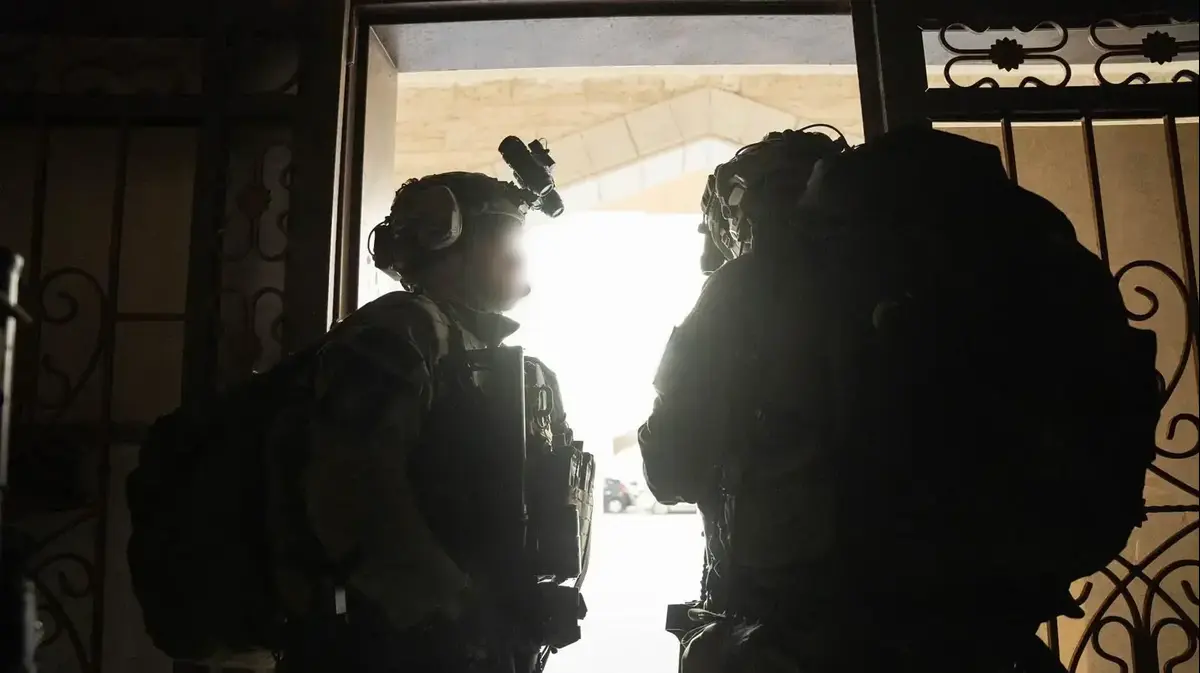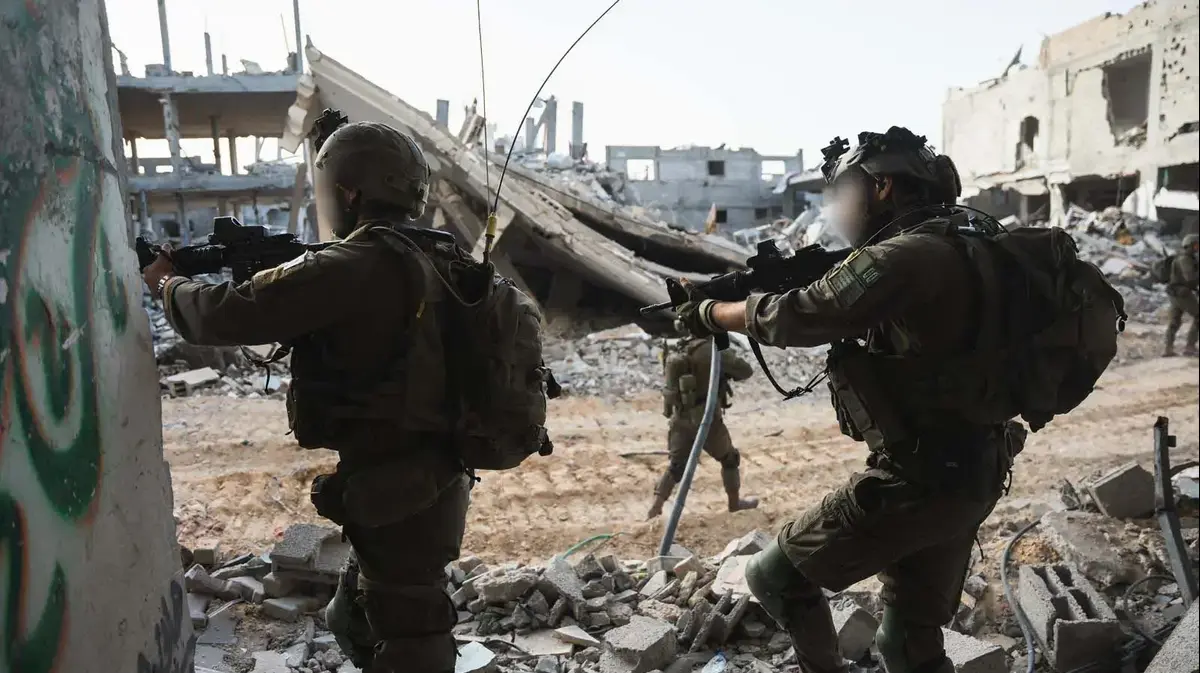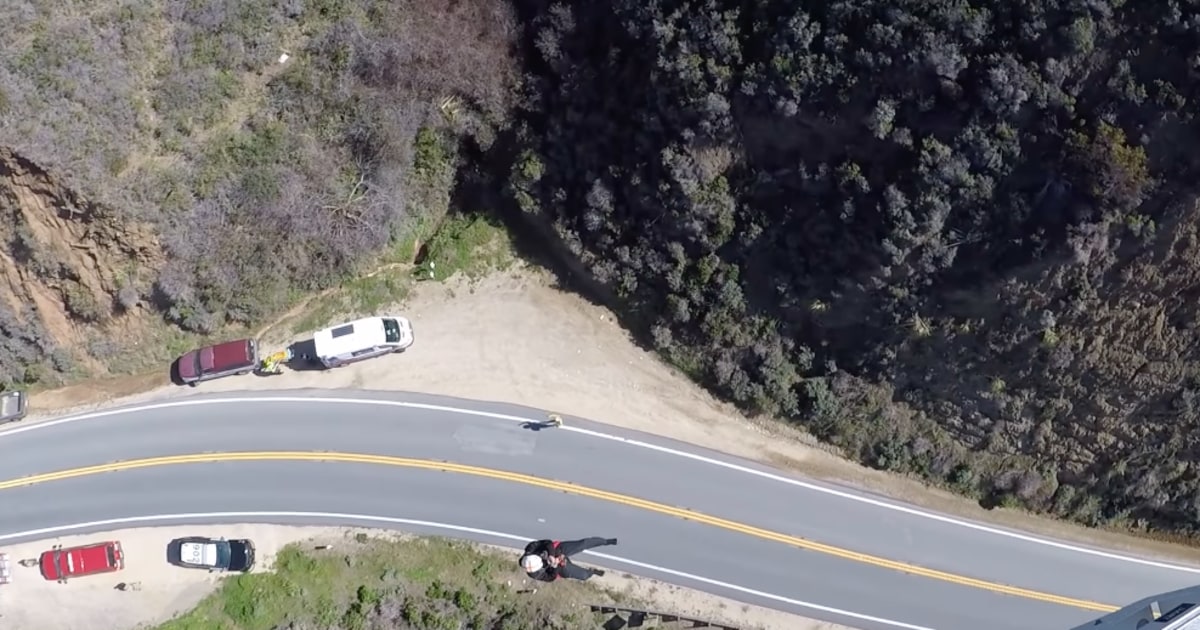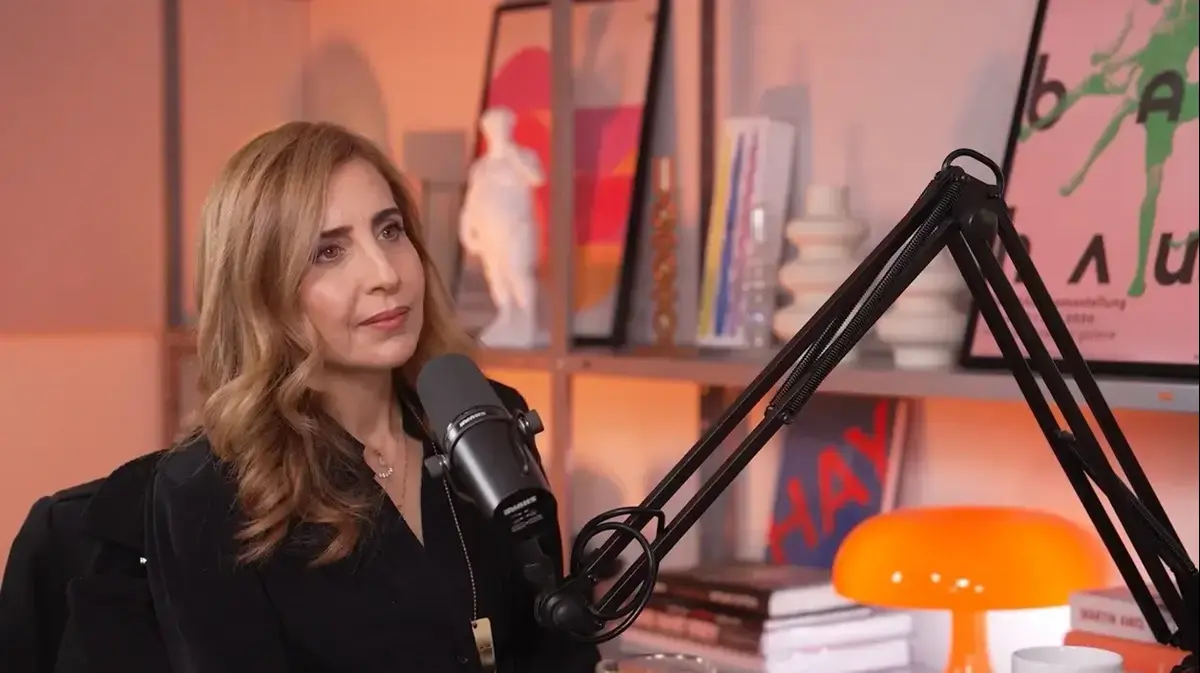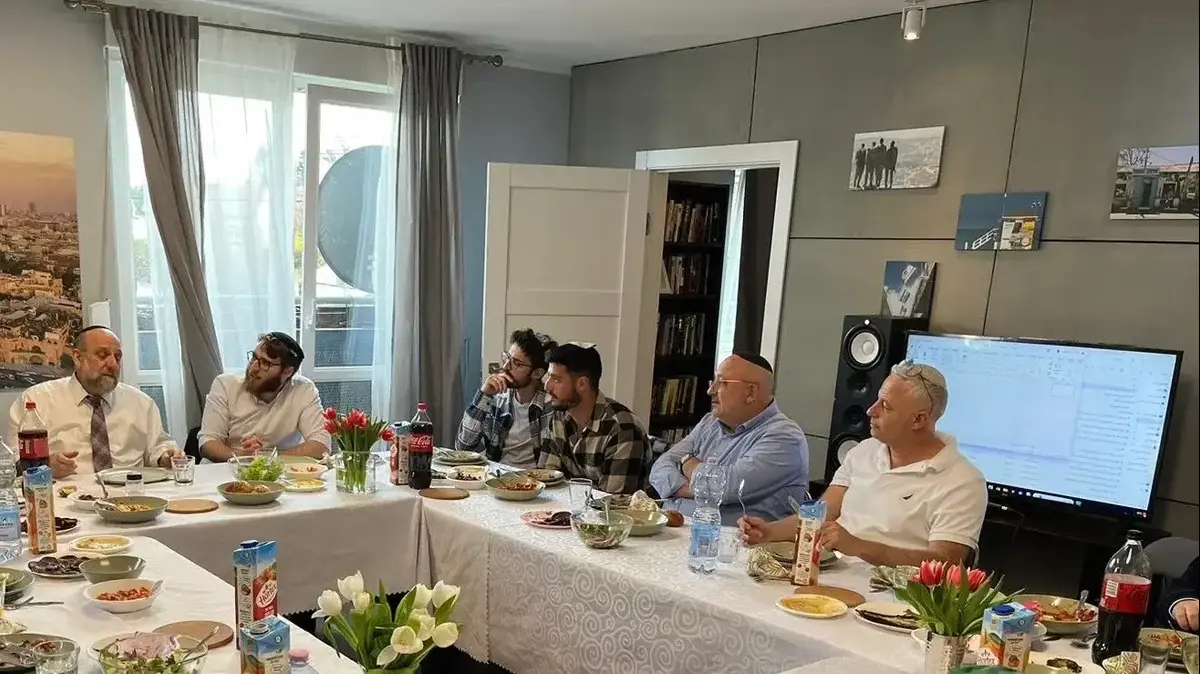Last Thursday, the night before the "Iron Man" competition of the global brand "Iron Man", Eli Sofer had a hard time falling asleep.
Again and again he ran in his mind the swimming, cycling and running tracks that awaited him, and tried to go through every possible scenario.
What happens if he starts swallowing water while swimming?
What if the muscles in his legs contract?
And at what speed can he replace a wheel on a bicycle, in the case of a flat tire?
He took a deep breath, memorized the mantra "Focus," kissed May, his partner, and only then was he finally able to fall asleep for a few hours.
Last Friday, at 6 a.m., Eli, 28, dressed in his swimwear, showed up at the starting line at Guy Beach on the Sea of Galilee, with his number 757 on his clothes.
He was followed by another 90 km of cycling, and 21 km of a half marathon.
Five hours and eight minutes after the jump, he crossed the finish line.
Only when diving into the story of his life can the magnitude of the achievement be understood.
He returns in question, leaving his home at the age of 13 and living on the street for a few years.
After a year in a pre-military preparatory school for at-risk youth, he managed to enlist in combat service and arrived at the Magellan Elite Unit.
During Operation Eitan, he was seriously injured when a burst of gunfire crushed his left knee, leaving him with 63 percent disability and post-trauma.
He underwent an extraordinary rehabilitation journey with the help of good people he met after the injury and who surround him even today.
At the age of 21, he studied literacy, completed his matriculation, and is currently completing a bachelor's degree in business administration at Reichman University in Herzliya.
Now he has also added the title "Iron Man" to his resume.
"Only a year ago I learned to swim, and you could say that only a month ago I learned to swim professionally," he says with a smile of winners, "so swimming was the part I was most afraid of.
"Right from the start I accidentally got kicked in the back from one of the swimmers, I felt dizzy and started swallowing water. The kayaks that accompanied us took my distress and wanted to get me out, but I did not agree. I took a deep breath, calmed myself and went into focus, just like I imagined the night before And I kept going. "
"I took a deep breath - and kept going."
Eli at the end of the swimming end, Photo: Michael Giladi - Ginny
• • •
We meet 24 hours after the competition.
Eli arrives with his girlfriend May, wearing running shorts, sneakers and a T-shirt that proudly bears the inscription IRON MAN.
"From now on this shirt does not come off your body," I say, and he smiles a conquering smile and explains with a half-apology that he changed a shirt on the way, after the one he wore got dirty.
"After the competition I slept from 8 pm to 7 am. I have not yet recovered, but I am already starting to prepare for the next competition."
already? Enjoy the achievement a bit.
"I'm very competitive with myself and constantly trying to see how I can be the best version of myself, in any field. When it starts to get tough, I feel good about myself."
Were you afraid you would not finish the competition?
"There was no such situation. Both before the race and while, all the time, I imagined myself crossing the finish line. After being delayed in the water, both because of the blow I got and because I still do not know how to swim so well, I wanted to reduce the gaps in the riding part. The bike, where I'm strong, I probably pressed too hard, so my twin muscles contracted in my legs.
"Even at this point, for a moment I did not think I would finish. I took salt pills and calmed myself down, until I overcame the pain from the contraction and knee injury that accompanied me throughout the competition. In the end, in this competition it is important to be mentally strong."
"I did not give up for a moment."
Eli at the finish line, Photo: Michael Giladi - Ginny
How did you even get to compete in triathlon?
"A year ago, a friend of mine asked me if I wanted to join him on a three-day bike ride from Latrun to the Dead Sea. I decided to join. It was the first time in my life that I rode 450km, but I managed it relatively easily.
When we finished, he told me I had to do a triathlon and Iron Man, that it suited me Bull.
"I did not know at all what it was. I went to Eilat, just at the time when the 'Israman' competition was held there, and I met Simon Farbstein, head of the 'Tikvat' organization, which helps IDF disabled people engage in sports activities.
"Thanks to the association and the donations it raised for me, I was able to train and compete, because it is an expensive sport, with a lot of equipment and personal training."
• • •
He was born in 1993, the 11th child out of the 12 children of an ultra-Orthodox couple from Jerusalem, who immigrated from the United States. His parents belong to the Lithuanian sect. Today he is in contact only with his brother Yehuda, who is five years older and lives in Miami.
"I studied at the Kaminitz Hassidic school in Jerusalem, which is considered prestigious and is taught in Yiddish. It is difficult to be accepted, I am the only one in my family who studied there, but I felt it was not right for me. To study, I would wander around the neighborhood or forest near the school until the end of the school day, then return home.
"Later I would run away from home for a few days, walk the streets and sleep on benches. When I wanted to eat I would ask people for money for the bus, and buy food.
"There was a time when I would run away to a cluster-level pet store to be with the animals. The store owner would ask me why I was not at school, and I would tell him we had time off. One time I took a business card from the store and forgot it in my pants pocket. My mother found it. And called the store owner, and out of the shame I was caught, I did not go back there anymore. "
At the age of 13 he left home permanently and rolled into the city center, Zion Square and Cats Square, known as places where homeless teenagers roam.
Two whole years living as a homeless man, trying to survive the harsh reality.
"Near the old town there was an abandoned building with a lot of homeless people, and there I could always get blankets to cover. Food I would collect mostly from the bins, and very quickly it became my daily routine.
"There were other children with me who ran away from home, but I did not trust anyone. I was exposed to a lot of violence and crime. Drugs were around me all the time, and even rape. These are shows a child should not see. Many fail to survive and fall into drugs, but I always knew I did not belong. "I knew I would not let myself fall into those places."
At the age of 15 he started working at a bar, as a table cleaner.
The owner soon promoted him to be in charge of the waiters, and even gave him a roof in the apartment above the bar, along with other employees of the bar.
In this work I became acquainted, for the first time, with a normative secular population.
"On weekends a lot of soldiers would come, and this was the first time I heard about the army. There was a cherry officer who came to the bar a lot and poisoned me about the army with his stories. These stories interested me, but not from a place of contribution to the country, but out of a desire to get there. "A framework in which I can integrate. I knew that my chances of being accepted into the army and doing something significant were very low, since I was not studying from the age of 13, and I knew how to read and write at the level of a child in first grade."
For three years, the Jerusalem bar served as a kind of family, providing it with stability, livelihood and a home.
Until he received an offer that he had a hard time refusing.
"One evening a guy named Shai came into the bar and told me that he was an instructor at the pre-military preparatory school that Steph Wertheimer had set up in the Galilee, 'Tzur Shalem.' For the first cycle.
"My boss at the bar and other people from the area told me, 'Leave you army, what about you and this.' But the idea fascinated me. I had a feeling that this was how I could move forward in life."
• • •
In 2011, when he was 18, Eli passed his personal interviews and was accepted to the mechina.
After years of living alone, without a framework and rules, he had to conform to the rules of the place and learn to get along with 50 boys his age, each from a different background, with a not-so-easy life story.
On weekends, when he left the mechina, the apartment above the bar in Jerusalem continued to serve as his home.
"The hardest part was when I was told what to do," he says.
"But all I saw before my eyes was the combat recruitment. In the mechina I discovered that I was very open to learning new things, that I was really thirsty for it. I was able to hide the fact that I was illiterate. I would study with everyone and participate in all the oral parts, but when The test I would wind up with all sorts of excuses, thus evading writing.
"Apart from the theoretical material we learned - for example, about the state, combat heritage and the troops in the army, we engaged in a lot of combat fitness activities, which prepared us for the effort required in service. I quickly discovered I ran fast and did not get tired.
"When I learned that everyone who completes the mechina enlists in the Nahal, I started to put pressure on them to let me enlist in the flotilla or the cherry.
It was my dream.
I did not want to go to the Nahal, and I was most afraid to go to the ultra-Orthodox Nahal, because since I left home I have had nothing to do with religion.
"It was important for me to show the people at the mechina that I was motivated and that they should help me enlist, and I used my advantage in sports to stand out socially. If everyone got up at 7 - I would get up at 5, fill the backpack with stones and start running. Her first cycle, they were afraid that if they allowed me not to go to the Nahal, everyone would follow me.
But very quickly they understood my commitment and supported me. "
Eli was forced to shelve the flotilla's dream when he discovered that the formation day was taking place on the last day of the mechina, which he had to attend.
In his place he went to the formation of paratroopers, where he finished each section in first place.
Following this, he was referred for formation to the brigade units (paratroopers' units), where those who pass him join units such as a paratroop patrol or Magellan.
"The initial formation for the paratroopers was difficult, but the second formation was several times tougher," he recalled.
"It's a formation of a few days, where you hardly sleep and there are a lot of runs, crawls and shifts. Set times that you have no chance of meeting in advance, just to see what the threshold of breakage and frustration is.
"One night we had to crawl on a field of thorns in one direction, run back, crawl again and again for goodness sake. I do not know how many times we did it. At one point I remember myself running, crawling, and while vomiting, but not breaking.
"When you finish, you are all full of thorns and scratches, you are seated to eat from cans, and examined who takes quickly for himself and who is waiting for the rest of the team. I also passed this formation successfully, and was informed that I was destined for Magellan. "There was a real battle between me and the two units."
"All I had in life was my teammates."
In Magellan, before the injury, Photo: From the private album
• • •
In March 2012, he packed a bag, said goodbye to the guys at the bar and went alone to the recruitment bureau in Tel Hashomer.
"I asked friends what to buy for the recruitment day, and that's how I got ready."
Weren't you afraid to go through the recruitment alone?
"Fear and pressure never deterred me. On the contrary, fear always motivated me to action. At that time I was very extreme in conduct. I had no middle ground, I would go to the edge and get what I wanted. I do remember a sense of positive excitement. I knew I was heading towards Something I'm really looking forward to. "
The training lasted seven months.
On weekends, Eli would go out to his apartment above the bar in Jerusalem, for which he paid rent, and work at the bar all weekend.
"On Sunday nights, my staff was the only one who got seven hours of sleep," he smiles.
"My commander knew I was working on the weekend and had no time to rest, so he came towards me.
"Only after my training did I become known as a lone soldier. I moved to an apartment in Jerusalem with four other lone soldiers. Every month I would receive a salary of NIS 1,200 from the army, which should have been enough for me to eat, pay bills and clothing.
"There were times when I felt alone. Especially in ceremonies like graduation, or on Saturdays, when parents would come to the base and open a table. I would always push them ... when I felt suffocated, I would take myself for a run and there I would break down emotionally, and cry sometimes. After such a breakup I would. He returns like new, with the strength to continue. "
Did the army know you were illiterate?
"Until the release no one knew anything. I always knew how to put my strengths on the table and hide the weaknesses. If they asked me something, I would dodge, move on a topic, or tell them - 'irrelevant, let's move forward.'
"Fortunately, I had a great focus on sports. I even broke an IDF record in a track tester (where you have to go through a section of running, wall, obstacles and rope climbing; MI). I finished the tester in six minutes and ten seconds. The last time I checked, I still haven't broken my record.
"I also broke a record in a marine tester at Wingate, which is similar to a track tester, but much more difficult because it also includes walking in deep water at sea and running the hardest ascent in Wingate, called 'Natural Disaster.' There I finished in 7:45 minutes."
• • •
At the end of my training, I began a year and a half of training a track as a soldier in Magellan.
He completed the route in April 2014. After the abduction of the three boys, on June 12, 2014, Eli's voyage participated in the search.
"It was a very difficult time. We jumped a lot for the arrests of terrorists and there was always a feeling that when they found the boys, an operation would start in Gaza. My team is the one who found their bodies, on June 30. The sight was shocking."
Immediately afterwards his voyage set out in the direction of the Gaza Envelope, and settled near the fence.
Their daily routine was characterized by many bounces, due to warnings of terrorist infiltration into localities, and at the same time, they were preparing for a possible entry into the Gaza Strip.
Were you scared?
"I had no sense of fear. The whole service taught us to put our emotions aside, to act like robots. Beyond that, I had nothing to lose: I was alone in the world, all I had in life were my teammates, whom I trusted with my eyes closed. By the way. When I closed my eyes, I could only recognize each of them by their smell. When I saw the silhouette of one of them, I knew immediately who it was.
"All I was interested in was getting in, doing the work and coming back with the whole team intact."
Since the beginning of the operation, on July 8, Eli and his friends have been engaged in missions in the Khan Yunis area.
After two exhausting weeks in the Strip, on the morning of July 22, the team entered to clear three houses, the passage of which was through a narrow corridor.
The purpose was to prevent the terrorists from placing explosives against IDF soldiers on the axis adjacent to the houses.
"Before entering the house, there is a purification procedure that must be performed. The instructions are not to enter from the window or door, but from a wall, in which a hole is opened by an initiated explosion. After the hole opens, a grenade is thrown into the house, and only then enter.
"Once one of the officers was about to throw the grenade, we saw that the whole space of the room was full of gas balloons. We fired at points where there were no balloons, and when we realized the space was free, we went in to scan the rest of the building.
"After entering the house, we saw that the wall facing the road did not exist, and that if we stayed there, we would be exposed. We advanced through the corridor that connects the houses to the other house.
"I and a friend of mine were instructed to pick up the explosives and take them out of the house, in the direction of a nearby olive grove. It was a stage where I felt insanely scared. I felt this walk last forever. When we were on our way back, there was a huge explosion. Top, got on a charge.They were lucky, only three guys were lightly injured, from shrapnel.
"At the same time, massive gunfire began from outside. We entered a combat procedure. My friend and I guarded at the end of the corridor the opening facing the road, with the instruction being to shoot at anyone approaching.
"When I turned around for a moment to see the condition of my friends, who were guarding the second opening of the corridor, I realized they were on the floor after snatching a bundle and being injured by the shrapnel. This was the stage where I realized I had to take shelter The weapons open the hallway without looking, and I fired.
"After I finished firing, I tried to get up and was unsuccessful. I touched myself with my legs, and I felt everything was wet. When I looked at my legs, I realized I had snatched a bullet in the knee, and all my bone was out. I shouted, 'Terrorist, I was injured!' On foot to stop the bleeding. "
Have you been evacuated under fire?
"At this point the Air Force was already giving us assistance, and the rescue tanks were waiting for us near the house. I could not step on the foot, so they wanted to evacuate me on a stretcher, but I did not agree. .I therefore preferred to jump on one leg, with only two soldiers supporting me on each side.I made a cold calculation of risk management.
"While jumping into the tank, I saw my leg swinging as if it was not attached to the body. All that went through my mind was that I had lost my leg, and that I could no longer do sports."
The tank evacuated Eli to the mobile vehicles, under fire, and from there he was transferred to Israeli territory.
A helicopter waiting there flew him to Soroka Hospital in Be'er Sheva.
"I was conscious all the way through, and the pain was terrible," he recalls, "with my luck I didn't get morphine, neither in the tank nor in the helicopter, because it didn't stay."
Just before landing in Soroka he was asked to give his parents' phone number so that army representatives would let them know.
"I said I was a lone soldier and gave my brother Yehuda's phone number, which is in the United States.
I have no idea how I remembered the whole number.
"Within 12 hours Yehuda had already settled by my bed. He stayed with me for two months."
• • •
Upon arriving at the hospital, Eli was rushed to the operating room.
Doctors repaired his knee joint, took skin from the pelvis to close the gaping hole in his leg and fixed the knee with irons to try to achieve optimal healing.
It was the first of five surgeries he would undergo in two weeks.
Leaving the operating room, a passerby entered Eli's room and asked him why he was alone.
Eli, who was still semi-vague, under the influence of painkillers, said he was a lone soldier.
The man took a picture of him and posted the picture on Facebook: "This soldier's name is Eli Sofer. He is in Soroka Hospital in Be'er Sheva, in room 3 in the orthopedic ward. No one came to visit him, and he needs basic things like slippers, shaving tools, etc." Please share. "
The viral post caused Eli's room to be filled with crowds of Israelis, who flocked to the hospital with crates full of food and equipment.
"I could not accommodate the masses of people who came," he smiles.
"It flooded me every minute of the day. On the one hand, I was very happy to see all the people of Israel come to help. On the other hand, I did not have a minute of silence, and I could not gather strength for rehabilitation. I lay in a room unable to move.
"After the fifth operation, my brother made sure that I was transferred quietly to Sheba Hospital. Many people also came there, including celebrities who wanted to make me happy, such as Idan Habib, Bar Refaeli, Adir Miller, Aviv Alush, Shalom Michaelshvili, Reshef Levy and Amos Tamam."
"Many came to make me happy."
With Shalom Michaelshvili, Amos Tamam and Aviv Alush, after the injury, Photo: From the private album
One day, shortly after he arrived at Tel Hashomer, the medical staff took his cell phone from him and did not bring newspapers to his room.
"I did not understand why they did not give me the phone, but I was blown away by painkillers, which did not really affect me. I suffered greatly.
"After a few days, he entered the hospital's psychiatrist's room. He told me that three of my party members - Sgt. Omar Chai Ninio, Sgt. Matan Gottlieb and Sgt.
It broke me.
I'm not a person who cries or shows emotion, but there I broke down in tears. "
Eli stayed for three months in rehabilitation at Tel Hashomer.
The crowds that frequented his room began to dwindle, and even his brother, who had not moved from his bed for two months, was forced to return to the U.S. When the moment came when he could leave the hospital on weekends for a vacation at home, he had nowhere to go.
"I was in a wheelchair, and I needed help preparing food, showers, even getting dressed. At this point, Doron Amir, the father of my commander Yuval, who accompanied me, and three mothers - Idit, Oranit and Yehudit, who knew me when they came to visit the wounded during Tzuk Eitan. Me with homemade foods, and to this day they help me.Judit even accompanied me to the competition.
"There were also two sisters who served in my unit, Maya and Yuval Rimoni, who came to visit me with their parents, Danny and Mickey, and brought me food. They told my parents that I could not go on weekends because I had nowhere to live and no one to help me, and the parents immediately agreed. To host me. "
It can be assumed that it is not easy for an independent person like you to be dependent on others.
"It was unbearable. But Danny and Mickey are amazing people, from whom I still learn about the resilience of a warm and loving family. They are very humble businessmen, who have showered me with love during the most difficult period of my life.
"I came to them in a wheelchair, and the better shower room was on the second floor. Every weekend I was with them, Danny would pick me up with the wheelchair to the second floor, so I could shower. They never complained, and all my life I will thank them for what they did for me.
"Unfortunately I could not stay there, because I needed help and assistance on a daily basis, and during the week they were at work and the house was empty. Just at that time, the eldest daughter of Drorit and Yair Nitzani, Einav, who was a classmate of the late Sgt. "During the Shiva, she heard about a lone soldier who was looking for a home for him. She shared with her parents, and with the release from Tel Hashomer, three months after the injury, their family simply adopted me."
• • •
"When my daughter told me about the lone soldier who needed a place to live, I immediately said yes," says Drorit Nitzani.
"At first I thought it was an immigrant from abroad, who was given a room and hosted on weekends and holidays.
Suddenly an Israeli guy arrived, accompanied by his officer's father.
This was the first time I was exposed to the fact that there are lone Israeli soldiers without a family backbone.
"Eli came to live with us at home with three girls, and at first it was not easy at all. Although he was no longer in a wheelchair, he suffered from post-trauma and anxiety, and would scream at night and wake up crying. I did not know what to do or who to turn to help me take care of him." .
How did you handle the situation after all?
"פניתי לציקי אוד, שעומד בראש המרכז לסיוע לחיילים בודדים ע"ש סמ"ר מייקל לוין ז"ל, והוא סייע לנו. מעבר לטיפולים הפסיכולוגיים שאלי הלך אליהם, ניסינו לחשוב ביחד מה יסייע לו לשקם את חייו. החלטנו שכדי שיהיה לו בעתיד אופק תעסוקתי, הדבר הראשון שהוא צריך זה להשלים 12 שנות לימוד.
"בשלב הזה גיליתי שהוא לא יודע קרוא וכתוב, ושיש לו פערים בהרבה תחומים בחיים. הוא הכיר קצת את האלף־בית, כי עד גיל 11 עוד למד באופן מסודר, אבל לא ידע להרכיב משפט בכתב".
אלי: "למשל, לא ידעתי מה זו דמוקרטיה, או איך הממשלה עובדת. לא הכרתי ספרים או שירים. עד היום אני לא מכיר את סיפור סינדרלה, לדוגמה. דרורית כל הזמן אומרת לי שאני חייב לקרוא אותו, אבל עוד לא הגעתי לזה. כשדורון, אבא של המפקד שלי, אמר לי שאני הולך לגור אצל יאיר ניצני, הקירח מלהקת תיסלם, לא הבנתי על מה מדובר".
"הרגשתי הכי עטוף בעולם". מימין: אלי עם דרורית, יאיר, אלה, ענבל ועינב ניצני, צילום: מיטל חדד
כדי לעזור לאלי, החליטו דרורית ויאיר לגייס לעזרתם את כל תושבי השכונה שבה הם מתגוררים בסביון. אחד לימד אותו לקרוא ולכתוב, אחד תרם שיעורי נהיגה, אחד לימד אותו מתמטיקה. שכן נוסף לימד אותו אזרחות, ואחרת אנגלית. אחרי כשנה, כשאלי הגיע לרמה טובה של ידע, רשמה אותו דרורית ללימודי תעודת גמר תיכון (תג"ת) בתל אביב, במסגרת הזכות להשלמת השכלה, שהגיעה לו כחייל משוחרר. הוא סיים בהצלחה, וקיבל תעודת 12 שנות לימוד.
יאיר: "מעבר לפערים בידע, אלי לא ידע מה המשמעות של מגורים עם משפחה. אפילו איך יושבים לאכול ליד השולחן ואיך מנהלים דיאלוג בלי להתפרץ לדברים של מי שמדבר. זה היה מסע של עקב בצד אגודל. אחד הדברים שהדהימו אותי בו, זה שהוא היה צמא ללמוד דברים חדשים, להשתפר ולהתקדם, והוא עשה את זה באפס זמן. הוא הדביק פערים של 15 שנה בפחות משש שנים. זה בלתי נתפס".
דרורית: "היום אני יכולה להגיד לך שבזכות אלי, החיים שלנו השתנו מן הקצה אל הקצה. אני זנחתי את עיצוב האופנה שבו עסקתי, וייסדתי תוכנית לטיפול בחיילים בודדים ישראלים ללא עורף משפחתי במרכז לזכר מייקל לוין. גם הבנות שלי עוסקות בפעילת התנדבותית. אין לי ספק שאלי הוא סיפור שהשפיע על כולנו".
• • •
התיאבון של אלי לכבוש את העולם ולהצטיין בכל מעשיו הוביל אותו ב־2015 להצטרף לטיול שחרור בהודו, שאותו יזם עדי שטראוס, שבשנים האחרונות מכהן כיו"ר אגודת הידידים של ארגון נכי צה"ל. "עדי לקח נכי צה"ל שלא עשו טיול שחרור. זו היתה הפעם הראשונה שעליתי על מטוס. הטיול הזה, שהיה גם מסע, גרם לי להבין שכדי להתקדם עם החיים שלי, אני חייב ללכת ללמוד".
שטראוס: "אלי הוא סיפור הצלחה מעורר השראה. אגודת הידידים של ארגון נכי צה"ל תומכת ביותר מ־50 אלף פצועי ופצועות צה"ל מעוררי השראה, בדרכם לשוב לחיים מלאים בחברה הישראלית".
אחרי שבועיים בהימלאיה, חזר אלי לארץ ונרשם ללימודים בני שלוש שנים, שבהם השלים בגרויות. במקביל, המשיך לעסוק בספורט. בשנת 2017, כשרגלו עדיין בתוך מתקן תמיכה, השתתף בתוכנית "נינג'ה ישראל".
"אני וחבר התאמנו לנינג'ה אוסטרליה, וכששמענו שזה מגיע לישראל, החלטנו להירשם לתחרות בארץ", הוא מספר. "נפלתי מייד בהתחלה בגלל שטות, השרוך של הנעל שלי נגע במים".
בשנת 2018 נרשם גם לעונה השנייה של התוכנית, אבל גם הפעם לא צלח את המסלול ("בערך באמצע הסתבכתי עם הידיים במעבר של אחד המכשולים, ונפלתי למים"). באותה שנה החל לימודי תואר ראשון במינהל עסקים במרכז הבינתחומי בהרצליה.
בעקבות האימונים לנינג'ה התוודע אלי לספורט הטיפוס. הוא מתאמן בקיר הטיפוס בבית הלוחם, שם הגיע לרמה גבוהה, ובשנה שעברה אף קטף את המקום הראשון באליפות ישראל בקטגוריית נכים. "הפעילות הספורטיבית מסייעת לי להתמודד מנטלית עם הפציעה ועם הפוסט־טראומה שלי. בזכות הספורט והאימונים אני כבר לא זקוק לכדורים פסיכיאטריים".
בזכות הפציעה אתה מי שאתה היום?
"אין לי ספק בכלל. הפציעה הצילה אותי ודחפה אותי קדימה, הכריחה אותי לחשב מסלול מחדש. בלעדיה, סביר להניח שהייתי חוזר לירושלים לעבוד בבר. בכלל, השינויים הקיצוניים בחיים מגיעים אחרי מכות קשות שניחתות עלינו, אבל משם צומחים ומתפתחים.
"אני מעביר היום הרבה הרצאות על הסיפור שלי. מרצה בפני חיילים, תלמידים, אנשי עסקים, כל מי שרוצה ללמוד איך צומחים מתוך משבר.
"אחד הדברים הכי קשים שעשיתי בחיים היה לעזוב את הבית של משפחת ניצני, אחרי שנתיים שבהן גרתי שם. זו היתה חממה שלא בא לך לעזוב. דרורית היתה מכינה לי שוקו וחביתה כל בוקר, והרגשתי הכי עטוף והכי מוגן בעולם.
"אבל דורון אמיר, שמלווה אותי עד היום, דחף אותי להתחיל דרך עצמאית. הוא ידע כבר אז את מה שאני יודע היום - שרק ככה אתפתח ואשתפר. היום אני רוצה לתרום לקהילה ולהחזיר קצת מהטוב שקיבלתי. לפני כמה ימים הלכתי לתל השומר לבקר חיילים פצועים שלא תשמעו עליהם בחדשות, כי הם לא נפצעו בקרב, אבל גם הם זקוקים ליחס, מבט חם ויד מלטפת.
"בשבוע הבא ייפתחו אירועי חודש נובמבר לפצועי מערכות ישראל ונפגעי פעולות האיבה, וחשוב לי להגיד לעם ישראל: אל תחכו רק לאירועים גדולים, למלחמות או למבצעים, כדי להתגייס לעזור ולחבק. תעשו את זה לאורך כל השנה".
• • •
מאז שעזב את בית משפחת ניצני התגורר אלי בדירת שותפים בתל אביב. בעוד שבועיים הוא יעבור להתגורר בפתח תקווה עם בת זוגו מאי אבני (26), העובדת כמתמחה במשרד עורכי דין שמייצג נכי צה"ל.
"נפגשנו על הדשא בבינתחומי לפני שנה וחצי", היא מספרת בחיוך מבויש. "אני התחלתי איתו, אבל בהמשך הוא גם חיזר אחריי".
"עזרה לי להביע רגשות". עם בת הזוג מאי אבני, צילום: מיכאל גלעדי - ג'יני
אלי: "בהתחלה לא סיפרתי לה על העבר שלי. אני אדם מאוד סגור שקשה לו לחשוף רגשות. סיפרתי לה רק אחרי כמה חודשים, כשהרגשתי יותר בטוח. היא מאוד רגישה ומכילה, ולא סתם היא למדה פסיכולוגיה. היא עזרה לי להיפתח ולהביע רגשות, והיום אני אפילו מסוגל לבכות בסרטים. בזכותה אני מסכים היום לחגוג ימי הולדת, ואפילו נהנה מהם. בעבר כל זה לא היה קיים".
הבית והמשפחה לא חסרים לך?
"Even when I was young, and even today, I do not dwell on difficult moments or memories, but always think about tomorrow. How I promote myself. After all, I took to the streets because I did not find myself at home. For me, the street was a place of refuge."
About a month ago, Eli started working as a manager in a project of the safety inspectors in the electrification process of the Israel Railways.
Between work and lectures, he is already training hard for the Israman competition, which will take place in Eilat.
"Because of the weather conditions and the terrain route, which includes many ascents, it will be more challenging than the 'Iron Man' competition. And from there everything is open. I have no doubt that I will continue to constantly look for ways to challenge myself more and more."
michali100@gmail.com

